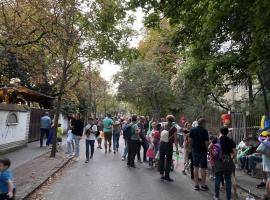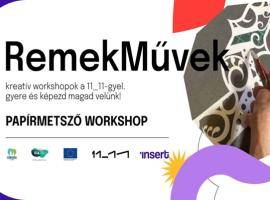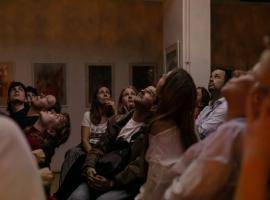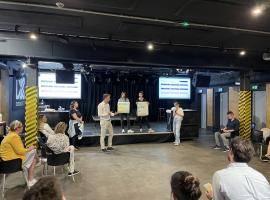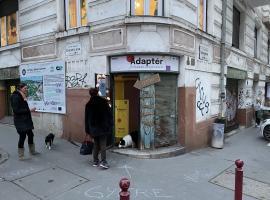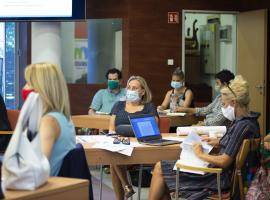Building new communities through culture: The legacy of CUP4Creativity in Újbuda

***
On 21 May 2022, a new bench was installed on the corner of Bartók Béla Boulevard. Although the installation of a new bench is not a big event in the life of a district, this was a special piece: it was designed and built by a local architectural association, Pálma, using one of the dozen plane trees that had been cut down due to the risk of accidents, justly mourned by the residents of the area. A few hundred metres away, a local art foundation (11_11) organised a workshop to capture the rings of the plane trees in prints, and a few steps away, the BME's special architecture college installed an insect hotel made from the felled trees. On the day of the bench's inauguration, a local architecture centre, KÉK, led a walk to link these sites and explain in an exhibition the environmental challenges facing urban trees and those working to protect them.
The action served several purposes at once: to commemorate the loss of the plane trees, to raise awareness among the inhabitants of the district about the fragility of urban wildlife, to respond to the challenges of climate change, and to create a new public space on the corner of Mihály Szabolcska Street for the shopkeepers and passers-by who like to stop there to chat with each other. The Platán project, although essentially a combination of small actions, is a good example of the cultural logic of using local resources and combining the knowledge of local cultural actors to respond to the local needs of the district’s inhabitants.
The CUP4Creativity project is born out of this cultural logic. In 2020, the Municipality of Újbuda's application was awarded the largest grant of the European Union given directly to cities and districts in the frame of the Urban Innovative Actions programme. The winning application envisioned the digitisation of the local cultural milieu and the dissolution of isolation through cultural events and connections, even before the online communication was accelerated due to the Covid-19 pandemic.
The winning application did not arrive into a vacuum. Újbuda had already been supporting the cultural and creative milieu that had emerged in the area over the past decade. Although the Bartók Quarter used to be a centrally located but quiet residential area, this picture started to change in the mid-2000s, when the Municipality of Újbuda developed a programme to develop Bartók Béla Boulevard into a cultural district. The programme included the renovation of the public spaces along the avenue and a strategy that attracted cultural and creative organisations in the avenue’s ground floor retail spaces.
A decade and a half later, Újbuda's downtown has become one of the most dynamic districts in the country, with countless galleries, studios and workshops, a rare concentration of cultural associations and creative industries not only on Bartók Béla Boulevard but also in the side streets. The Cultural Quarter development has proved to be a successful initiative in many respects, but it has left local cultural operators with a sense of lack. Although local events and services have become a defining feature and attraction of the Bartók Quarter, they have failed to reach everyone: culture has not become a natural part of everyday life. Another great opportunity of Lágymányos was not exploited: the largest institutions in the area, the University of Technology and the faculties of social sciences and natural sciences of the ELTE University, did not become an integral part of the cultural quarter. Thousands of students from the universities tended to attend leisure activities linked to their own institutions, and graduates, while they had a good chance of opening their IT, engineering and architecture offices in the area, rarely took a public role in the local cultural scene.
One of the main ambitions of the CUP4Creativity project was to fill these gaps and create these missing links: to bring BME, ELTE and local technology organisations and companies closer to the cultural scene by combining art, technology and ecology, and to reach out to people in Újbuda who have not yet been able to enjoy the local cultural offer and participate in the social life of the district. The project asserts that a neighborhood can become more resilient to economic, environmental, and social challenges by fostering cultural connections among residents. This involves cultural venues, local businesses, hospitality, and neighborhood initiatives working together. Such collaboration helps share limited local resources effectively, such as leisure time for community engagement, knowledge from residents and businesses for neighborhood initiatives, shared spaces and tools for cultural activities, jointly maintained green spaces, and recycling or composting of waste.
CUP4Creativity has contributed to strengthening the local cultural ecosystem with a number of newly developed, experimental tools. The mapping of local actors helped to better understand potential overlaps and collaborations, understanding that new offline and online spaces were needed to make these collaborations a reality. One of the main outcomes of the project is the creation of a new creative technology knowledge hub, Adaptér, a name made up of the words “adaptation” and “space”, which interweaves the perspectives of art and technology in a visitor-friendly space and programming. Equipped with a state-of-the-art technological infrastructure, Adaptér provides users with access to a wide range of tools and equipment, while hosting training courses, workshops, cultural events and exhibitions. Adaptér was conceived by the municipality's cultural company, Központ Kft., together with local partners, to become a space that introduces culture, creativity and technology into the everyday lives of residents and organisations in Újbuda through the stages of inspiration, education and creation.
Other important results of the project include an online platform and an offline event series. The Insert platform has created a digital space that both acts as a local event calendar and connects the supply of cultural places, services, knowledge and skills with the demand for them. The Insert programme has helped to bring these collaborations into the offline space and to expand the cultural field in Újbuda by organising concerts, training courses, theatre performances and festivals in apartments, offices, studios, rooftops and other unusual venues (Private Stage). A competition for university orchestras (Great Hall) brought students from BME and ELTE closer to the cultural life of the district. The municipal call for public space interventions (The Square is Yours!) which Insert helped to re-launch, have encouraged the creation of new initiatives in which active citizens have become drivers of local issues, by organising street festivals, building new communities, and implementing joint projects with neighbours.
This list only scratches the surface of the countless events, research, collaborations and inspirations that CUP4Creativity has created or supported in Újbuda over the past three years. From awarding the Urban Innovative Actions grant in 2019 and the launch of the project in 2020 until December 2023, the project has seen a succession of events: new cultural spaces have opened, several studios have been renewed, an online platform has been created, while dozens of community programmes have been born, drawing on the creative energies of local people.
One of the most important results of the project, however, is the cultural ecosystem that has been developed, extended and strengthened by the project. Over the last three years, hundreds of residents, artists, architects, cultural producers, associations, restaurants and businesses have been involved in the CUP4Creativity process, mobilising their free time, knowledge and expertise to achieve the project's goals. Even more importantly, citizens of the district were not only introduced a series of events but also learned how to build community with their neighbours, how to participate in Adaptér or Insert programmes, where to apply with their creative ideas, how to get involved in the cultural, technological and ecological development of the district: how to be an active contributor to their common home, Újbuda.
The evolution of CUP4Creativity has been far from linear. As an external expert, following and supporting the project, I have seen critical situations, crises and changes in strategy. The partners involved in the project have played an extremely important role in enabling such a complex enterprise to adapt to changing circumstances and emerging challenges, sometimes gathering new strength and changing direction. This partnership - made up of civil society and market actors, innovators, researchers and artists - ensured a diversity of perspectives and knowledge, offering solutions to issues that could not have been addressed by the municipality or by one partner alone. This implies that the project required constant renewal, as it consistently gained enrichment from new individuals bringing new ideas, perspectives, expertise, and energy to Újbuda.
The key legacy of CUP4Creativity is this extended partnership that forms the cultural ecosystem of Újbuda, a dense network of relationships and collaborations based on complementary roles and shared resources, which has strengthened, grown and intertwined with new areas over the past three years. The district is building on this legacy: the Bartók Quarter Round Table, made up of the most active actors in the district, has been established to meet regularly in order to coordinate the work of cultural actors, set common goals and comment on municipal achievements.
CUP4Creativity is not the only culture and heritage programme supported by the European Urban Initiative. Similar initiatives have been launched in Kosice, Ghent, Tilburg, Almeria, Athens, cities facing similar challenges in building their own cultural communities by capitalising on their heritage. Újbuda has thus become part of an international network of cities that regularly exchange experiences, learn from each other and help each other. This network will not disappear once the project is officially completed, but will continue to be a useful reference in the future, which can be particularly important in times of resource scarcity.
The CUP4Creativity project ends in December 2023, but the work will not stop. The Adaptér, which opened a few months ago, is now really taking off, serving the Bartók Quarter with events, workshops and training sessions. The space at Bercsényi Street space will soon be joined by a workshop venue on the neighbouring Lágymányosi Street, where more tools will be available to visitors. The Insert platform will continue to gather programmes, venues and capacities in the district, connecting the resources of the neighbourhood with those who can use them. The logic of the Insert programme will live on in the various municipal calls and initiatives, supporting the inhabitants of the district to come closer together through culture and to address various social, economic and environmental challenges. The street communities and neighbourhood initiatives that the project has helped to create will not disappear: they will embark together on new challenges and new programmes, building on events that have become a tradition and developing new ones, welcoming with the people of Újbuda who want to do something for their community.
***











